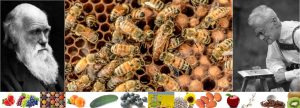My group focuses on honey bee biology and health. We use honey bees as the main model to study a variety of exciting biological questions. Specifically, we are interested in behaviour, stress, life history evolution, and diseases. In addition to our basic research, we address the urgent topic of honey bee health by specifically studying honey bee viruses and parasitic Varroa mites.

My students and I are a dynamic, collaborative group, amalgamated by our love for scientific exploration of the natural world around us. We explicitly welcome equity, diversity, and inclusion, work against any kind of discrimination, and strive to broaden the participation in research and academia and embrace national, institutional, and departmental guidelines. We have developed a code of conduct to encourage a welcoming and productive work atmosphere for all.

Pollinators, and honey bees in particular, are critical contributors to this natural world and are also vital to human food production. Honey bees live in complex societies that can be explored in many ways and add a level of biological organization that allows for unique tests of biological theories. We employ a variety of research approaches, including advanced apiculture, behavioural observations, approaches used in disease ecology, experimental evolution, toxicology, theoretical modeling, and bioinformatic analyses of large-scale data sets, and molecular lab techniques to determine genotypes or gene expression at genomic scales.

